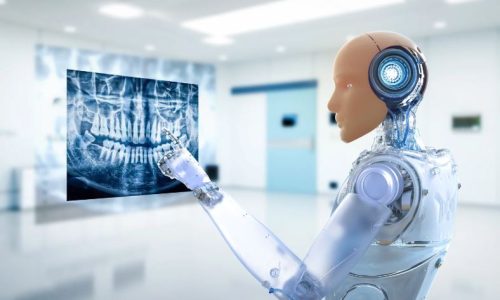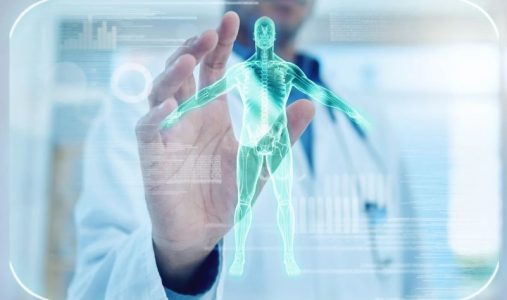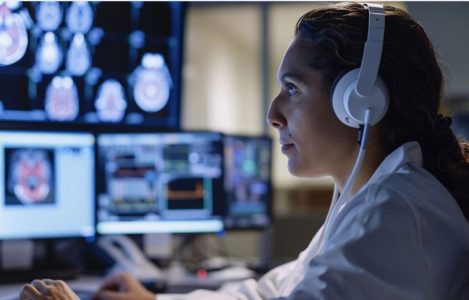Artificial Intelligence (AI) is transforming every sector, and healthcare is no exception. From improving diagnostics to revolutionizing drug discovery, AI is reshaping the medical field.
But what are the key applications, benefits, and challenges of AI in healthcare? How is it paving the way for the future of medicine?
In this article, we will explore how AI is being utilized in healthcare, its impact on various aspects of medicine, and what the future holds for AI-driven innovations in the medical industry.
What is Artificial Intelligence in Healthcare?
Artificial Intelligence (AI) in healthcare refers to the application of machine learning algorithms, deep learning systems, and other AI technologies to improve patient care, medical research, and operational efficiency in healthcare settings.
AI helps healthcare professionals analyze vast amounts of medical data to make better-informed decisions, predict outcomes, and streamline administrative processes.
The importance of AI in healthcare lies in its ability to:
- Improve diagnostic accuracy by analyzing medical images and clinical data.
- Enable personalized medicine by identifying treatment plans tailored to individual patients.
- Automate repetitive administrative tasks, saving time and resources.
- Facilitate drug discovery and research by speeding up clinical trials and molecular studies.
For instance, AI algorithms can detect diseases like cancer in their early stages with higher precision than traditional methods, offering life-saving potential. AI-powered tools also assist doctors in clinical decision-making, minimizing errors.
Furthermore, as healthcare costs rise, AI-driven solutions can reduce expenses by automating tasks like data management, scheduling, and billing.
The integration of AI into healthcare systems is crucial for improving patient outcomes while addressing inefficiencies in the industry.
How is AI Transforming Diagnostics and Medical Imaging?

Diagnostics and medical imaging are two critical areas where AI has made remarkable strides. AI algorithms use deep learning to analyze imaging data such as X-rays, CT scans, and MRIs with exceptional precision and speed.
Applications of AI in Diagnostics:
- Radiology: AI systems can identify tumors, fractures, and abnormalities in medical images, assisting radiologists in detecting life-threatening diseases like cancer and stroke early.
- Pathology: AI-based tools analyze pathology slides to detect patterns in tissue samples, improving diagnostic accuracy for diseases like leukemia.
- Ophthalmology: AI-powered solutions can screen for diabetic retinopathy by analyzing retinal images, helping prevent vision loss.
Case Study: AI in Medical Imaging
According to the Stanford University AI in Healthcare program, AI tools are capable of detecting breast cancer in mammograms up to 94% accurately. This level of precision reduces human errors and allows doctors to focus on patient care.
Benefits of AI in Diagnostics:
- Faster diagnosis and reduced waiting times for patients.
- Increased accuracy, minimizing false positives or negatives.
- Better resource allocation for radiology departments.
AI’s transformation of diagnostics is revolutionary, as it reduces the burden on healthcare professionals while improving patient outcomes.
What Role Does Machine Learning Play in Personalized Medicine?
Personalized medicine uses patient-specific data, such as genetic profiles and medical histories, to create individualized treatment plans. Machine learning (ML), a subset of AI, plays a key role in this process by identifying patterns and predicting responses to treatments.
How ML Aids Personalized Medicine:
- Genomic Data Analysis: ML algorithms analyze DNA sequences to determine a patient’s susceptibility to certain diseases and suggest targeted therapies.
- Treatment Response Prediction: ML models predict how patients will respond to different medications, reducing trial-and-error approaches.
- Precision Oncology: AI assists oncologists in identifying mutations and recommending cancer therapies tailored to a patient’s genetic profile.
Personalized medicine powered by machine learning ensures that patients receive the most effective treatments, minimizing side effects and improving recovery outcomes.
This approach revolutionizes traditional healthcare, making treatments more precise, efficient, and patient-centric.
How is AI Revolutionizing Drug Discovery and Development?

The drug discovery process is traditionally time-consuming and costly, taking up to 10-15 years to develop a new drug. Artificial intelligence accelerates this process by analyzing biological data, identifying drug candidates, and predicting their effectiveness.
Key Ways AI is Transforming Drug Discovery:
- Target Identification: AI identifies disease-related genes and proteins as potential drug targets.
- Molecular Simulation: AI algorithms predict how drugs interact with the human body at a molecular level.
- Clinical Trial Optimization: AI helps recruit participants and analyze trial results, ensuring faster outcomes.
AI-assisted platforms have discovered drug candidates for rare diseases in record time. This reduces the typical research phase by years.
Benefits of AI in Drug Development:
| Traditional Methods | AI-Powered Methods |
| Time-consuming | Faster drug identification |
| Expensive (billions) | Cost-efficient |
| Limited data analysis | Scalable data processing |
AI’s role in drug discovery not only enhances research capabilities but also provides hope for quicker solutions to pressing health challenges.
What Are the Benefits and Challenges of AI-Powered Virtual Health Assistants?
AI-powered virtual health assistants, such as chatbots and voice-activated tools, are transforming patient care and engagement. These tools offer 24/7 support, providing medical advice, appointment scheduling, and symptom tracking.
Benefits:
- Improved Patient Engagement: Virtual assistants empower patients to manage their health independently.
- Reduced Workload: They handle routine queries, allowing healthcare professionals to focus on complex tasks.
- Accessibility: Patients in remote areas can access basic medical support.
Challenges:
- Data Privacy Concerns: Handling sensitive patient data raises security risks.
- Limited Accuracy: AI tools may lack human intuition, leading to misdiagnosis.
- Adoption Resistance: Healthcare providers and patients may hesitate to rely on AI tools.
Virtual health assistants bridge the gap between patients and healthcare systems, improving accessibility while reducing costs. However, addressing challenges like data privacy is essential for wider adoption.
How Does AI Improve Predictive Analytics and Clinical Decision-Making?

AI-driven predictive analytics uses data to forecast patient outcomes, identify health risks, and optimize treatment plans. It enhances clinical decision-making by providing evidence-based insights to healthcare professionals.
Applications:
- Predicting disease outbreaks (e.g., flu and COVID-19).
- Identifying patients at risk of hospital readmission.
- Analyzing patient vitals to detect early signs of deterioration.
For example, AI-based tools like Epic Systems predict sepsis in hospitalized patients, reducing mortality rates.
Predictive analytics ensures proactive healthcare, enabling doctors to intervene before conditions worsen.
What Ethical and Privacy Concerns Surround AI in Healthcare?
The integration of AI in healthcare raises ethical and privacy concerns, such as:
- Patient Consent: How data is collected and used raises questions about patient autonomy.
- Bias in Algorithms: AI systems may reflect biases from training data, leading to unfair treatment outcomes.
- Data Security: Storing large amounts of healthcare data increases the risk of cyberattacks.
- Transparency of AI Decisions: The decision-making processes of AI systems often lack transparency, making it difficult for healthcare providers to trust the recommendations fully.
- Job Displacement: Automation and AI adoption may lead to a reduction in the need for certain medical roles, raising workforce concerns.
- Legal Accountability: Determining accountability when an AI system makes an error or harms a patient remains a significant ethical challenge.
Addressing these challenges requires strict regulations, transparent AI systems, and ethical AI deployment.
How Will AI Shape the Future of Healthcare Delivery and Automation?

AI is set to revolutionize healthcare delivery through automation. From robotic surgeries to administrative workflows, AI will improve efficiency and patient care.
Future Trends:
- Robotic-Assisted Surgeries: AI-powered robots assist surgeons with precision and minimal invasiveness.
- Remote Monitoring: AI tools track patient health through wearables.
- Administrative Automation: AI streamlines billing, scheduling, and record-keeping.
- AI-Enabled Virtual Nursing Assistants: These AI tools provide round-the-clock patient support by answering queries and monitoring symptoms.
- Improved Emergency Response: AI systems analyze patient data in real time to prioritize emergency care, improving outcomes during critical situations.
- Enhanced Interoperability: AI-driven systems facilitate seamless integration and sharing of healthcare data across hospitals, clinics, and healthcare providers.
The future of healthcare relies on AI, ensuring better resource management, improved outcomes, and personalized care.
Conclusion
AI in healthcare has already begun to revolutionize the medical industry by improving diagnostics, automating administrative tasks, and delivering personalized treatment options.
Its potential to enhance patient outcomes, reduce costs, and streamline healthcare delivery is unmatched. However, challenges like ethical concerns, data security, and AI system biases need careful attention.
The future of AI in healthcare is promising, offering solutions to some of the sector’s most pressing issues. As technology advances, integrating AI responsibly and ethically will be key to realizing its full potential for improving healthcare delivery globally.
FAQs
How does AI improve medical diagnostics?
AI improves diagnostics by analyzing medical images and clinical data with high precision, helping detect diseases like cancer and neurological disorders earlier.
What are the benefits of AI in healthcare?
AI offers faster diagnoses, reduced human errors, personalized treatment plans, streamlined workflows, and enhanced patient care.
Are there any ethical concerns with AI in healthcare?
Yes, ethical concerns include data privacy issues, algorithmic biases, lack of transparency in decision-making, and patient consent.
How is AI used in drug discovery?
AI accelerates drug discovery by analyzing complex biological data, predicting drug effectiveness, and optimizing clinical trial processes.
What challenges does AI face in healthcare implementation?
Challenges include data security risks, lack of AI integration in existing systems, high costs, and resistance to AI adoption by healthcare providers.
How will AI shape the future of healthcare?
AI will shape the future by improving robotic surgeries, enabling remote patient monitoring, streamlining administrative workflows, and delivering predictive healthcare solutions.




